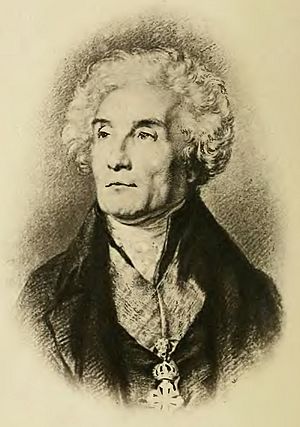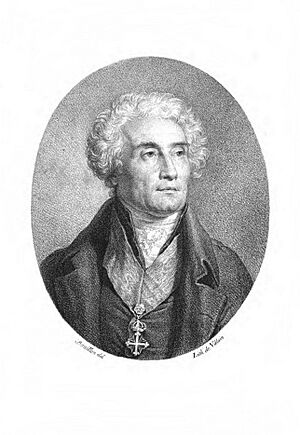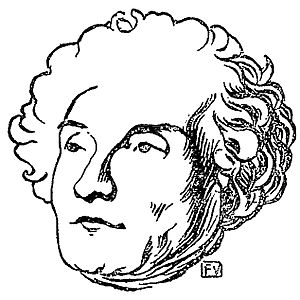Joseph de Maistre facts for kids
Joseph Marie, comte de Maistre (1 April 1753 – 26 February 1821) was a Savoyard philosopher, writer, lawyer, and diplomat. He lived during a time of big changes, right after the French Revolution. Maistre believed in a strong social hierarchy (where society has different levels of importance) and monarchy (rule by a king or queen).
Even though he had strong ties to France, Maistre was a citizen of the Kingdom of Sardinia his whole life. He worked for his country in many important roles. He was a member of the Savoy Senate from 1787 to 1792. Later, he served as an ambassador to Russia from 1803 to 1817. Finally, he became a minister of state in Turin from 1817 until he passed away in 1821.
Maistre was a key thinker in the Counter-Enlightenment movement. This movement pushed back against the ideas of the Age of Enlightenment, which focused on reason and individual freedom. He also helped shape Romanticism, a movement that valued emotion and tradition. Maistre believed that monarchy was a system chosen by God and the only way to have a stable government. He wanted the House of Bourbon kings to return to power in France. He also thought the Pope should have the highest authority in worldly matters. Maistre argued that rejecting Christianity led to the chaos and violence of the French Revolution.
Contents
Joseph de Maistre's Life Story
Maistre was born in 1753 in Chambéry, which was then part of the Kingdom of Piedmont-Sardinia. His family had roots in both France and Italy. His grandfather was a successful merchant and councilman. His father, François-Xavier, became a judge and senator, and was even given the title of count by the King. Joseph's younger brother, Xavier, became a famous writer.
Joseph de Maistre likely received his education from the Jesuits, a Catholic religious order. After the French Revolution, he strongly defended the Jesuits. He studied law at the University of Turin and became a Senator in 1787, just like his father.
From 1774 to 1790, Maistre was part of a Masonic group in Chambéry. At first, he supported some political changes in France. He even thought about joining the Estates General, a meeting of different groups in French society that King Louis XVI called. However, he became worried when the Estates-General decided to combine the nobles, clergy, and commoners into one group, which became the National Constituent Assembly. After some major changes were passed in August 1789, he completely turned against the direction the French Revolution was taking.
When the French revolutionary army took Chambéry in 1792, Maistre had to leave. He couldn't find a job at the royal court in Turin, so he went back the next year. But he decided he couldn't support the French-controlled government. So, he left again, this time for Lausanne, Switzerland. There, he talked about politics and religion at the home of Madame de Staël. This is where he started his career as a writer against the Revolution. He wrote books like Lettres d'un Royaliste Savoisien ("Letters from a Savoyard Royalist").
From Lausanne, Maistre traveled to Venice and then to Cagliari. This was where the King of Piedmont-Sardinia had moved his court after French armies took Turin. In 1802, Maistre was sent to Saint Petersburg in Russia as an ambassador to Tsar Alexander I. He didn't have many diplomatic duties there. Instead, he became very popular among the wealthy and noble people in Russia. He even convinced some of his friends to become Roman Catholic. During this time, he wrote some of his most important books on political philosophy.
Maistre's notes about life in Russia were used by Leo Tolstoy when he wrote his famous novel War and Peace. After Napoleon was defeated, Maistre returned to Turin in 1817. He worked as a judge and minister until he died on February 26, 1821. He is buried in the Jesuit Church of the Holy Martyrs in Turin.
Joseph de Maistre's Ideas
Political Views
In his book Considérations sur la France ("Considerations on France", 1796), Maistre believed that France had a special role from God. He saw the French Revolution of 1789 as an event guided by God. He thought that the French monarchy and nobles, instead of guiding French culture for good, had promoted ideas that went against religion. He argued that the terrible violence of the Reign of Terror was a direct result of the Enlightenment ideas and also a punishment from God.
In another book, Essai sur le Principe Générateur des Constitutions Politiques et des Autres Institutions Humaines ("Essay on the Generative Principle of Political Constitutions and other Human Institutions", 1809), Maistre said that constitutions are not just made up by people. Instead, he believed they come from God and slowly develop over time.
What made Maistre's writings special was not just that he defended kings and religious power. He also explained why it was practical to have one person in charge who could make strong decisions. He also looked at how society accepts this authority. He told French nobles that they needed to understand why they were royalists, not just feel it. He said it was a "science" to love the ruler and order. His ideas about authority and its acceptance by society were important for early thinkers in sociology, like Auguste Comte.
Religious Beliefs
In his book Du Pape ("On the Pope", 1819), Maistre explained his ideas about religious authority. He believed that if governments tried to explain their power only through logic, it would lead to endless arguments and chaos. Because of this, Maistre argued that government power must come from strong, non-logical reasons that people should not question. He thought that political power should come from religion. In Europe, he believed this religious power should ultimately belong to the Pope.
Thoughts on Ethics
Maistre also wrote two books that were published after he died. One of them, Soirées de St. Pétersbourg ("St Petersburg Dialogues", 1821), is a discussion about why evil exists. Maistre argued that evil has a place in God's plan. He believed that the sacrifice of innocent people could help others make up for their sins and return to God. He saw this as a mysterious but certain law of human history.
Views on Science
His other posthumous book, Examen de la Philosophie de Bacon, ("An Examination of the Philosophy of Bacon", 1836), criticized the ideas of Francis Bacon. Maistre thought Bacon's ideas led to harmful ways of thinking. Maistre also believed that great scientific discoveries came from genius and inspiration, not just from following a strict method. He pointed to scientists like Johannes Kepler, Galileo Galilei, and Isaac Newton as examples of inspired thinkers.
Joseph de Maistre's Impact
Influence on Politics
Joseph de Maistre is often seen as one of the founders of conservatism in Europe, along with Edmund Burke. His writings had a big impact on thinkers like Juan Donoso Cortés in Spain and Charles Maurras in France.
However, Maistre's ideas also influenced other groups, including early sociologists like Auguste Comte. These thinkers recognized how Maistre's ideas helped them understand what holds society together and where political power comes from.
Some critics, like Émile Faguet, described Maistre as a very strict thinker. Faguet called him a "fierce absolutist" and a "furious theocrat," meaning he strongly believed in absolute rule by kings and religious leaders.
Impact on Literature
Maistre was a skilled writer, and his clear, strong style means people still read his works today. Matthew Arnold, a famous critic from the 1800s, praised Maistre's writing. He said Maistre's use of the French language was "masterly" and very powerful.
The Catholic Encyclopedia in 1910 described his writing as "strong, lively, picturesque." It noted that his lively style and good humor made his serious tone easier to read. George Saintsbury called him "unquestionably one of the greatest thinkers and writers of the eighteenth century." Even Alphonse de Lamartine, who disagreed with Maistre's politics, admired his beautiful writing.
Maistre is also connected to the Romanticism movement, which valued emotion and imagination. Charles Baudelaire, a famous Romantic poet, said he learned how to think from Maistre.
Images for kids
See also
 In Spanish: Joseph de Maistre para niños
In Spanish: Joseph de Maistre para niños
- Louis Gabriel Ambroise de Bonald
- François-René de Chateaubriand
- Romanticism






